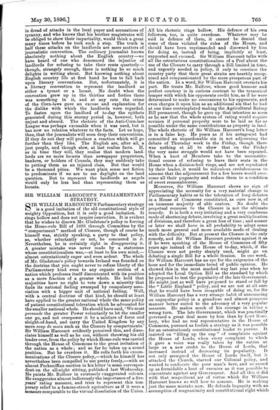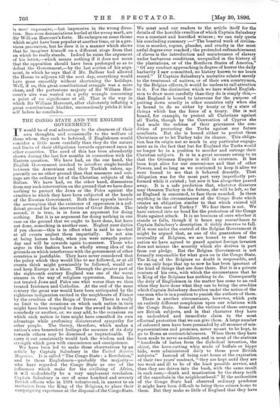SIR WILLIAM HARCOURT'S PARLIAMENTARY STRATEGY.
SIR WILLIAM HARCOURT'S Parliamentary strategy is a good imitation of the old constitutional style of weighty Opposition, but it is only a good imitation. It rings hollow and does not inspire conviction. It is evident that he wishes to disown Mr. Gladstone's policy in forcing the Home-rule Bill of 1893 through Committee by the "compartment" method of Closure, though of course he himself was, strictly speaking, a party to that policy, as, whether reluctantly or not, he concurred in it. Nevertheless, he is certainly right in disapproving it. A greater mistake was never made by a statesman whose constitutionalism was,—at least to his own mind,— almost ostentatiously eager and even ardent. The whole of Mr. Gladstone's policy towards Ireland was founded on the doctrine that you ought never to refuse liberty of the Parliamentary kind even to any organic section of a nation which professes itself discontented with its position as a mere fraction of a greater whole. He held that majorities have no right to vote down a minority that finds its national feeling swamped by compulsory asso- ciation with a bigger unit of national feeling. Well, with a central doctrine of that kind, he should at least have applied to the greater national whole the same policy of patient constitutional toleration which he advocated for the smaller national whole. He should have said, We must persuade the greater Power voluntarily to let the smaller one go, and not overpower it by a mixture of force and sleight-of-hand, and carry the United Kingdom by any mere coup de main such as the Closure by compartments.' Sir William Harcourt evidently perceived this, and disso- ciates himself as well as he can, without throwing his old leader over, from the policy by which Home-rule was carried through the House of Commons to the great irritation of the nation as a whole ; and so far he takes up a sound position. But he overdoes it. He rolls forth his excom- munications of the Closure policy,—which he himself has nevertheless been compelled to use pretty freely,—with an almost Pecksniffian unction in his letter to some correspon- dent on the all-night sitting, published last Wednesday. He paints Mr. Balfour in extremely exaggerated colours. He exaggerates almost ludicrously the importance of a five- years' rating measure, and tries to represent this tem- porary relief to a famine-struck agriculture as if it were a measure comparable to the virtual dissolution of the Union. All his rhetoric rings hollow. His defence of his own followers, too, is quite overdone. Whatever may be said in defence of them, it cannot be denied that some of them violated the rules of the House, and should have been reprimanded and disowned by him for doing so, instead of being, implicitly at least, supported and excused. Sir William Harcourt talks with all the ostentatious constitutionalism of a Peel about the- use of the Closure to carry through a Bill limited in time, and urgently needed in policy, if only to convince the country party that their great straits are heartily recog- nised and compassionated by the more prosperous part of the nation. In a word, Sir William Harcourt overacts his- part. He treats Mr. Balfour, whose good humour an& perfect courtesy is in curious contrast to the tyrannical temper with which his opponents credit him, as if he were determined to make no concessions to his opponents, and even charges it upon him as an additional sin that be bad at one time contemplated making the Agricultural Rating Bill permanent, though he gave up that intention so BOOD as he saw that the whole system of rating would require revision if personal property were to be laid as far as possible under the same contributions as property in land. The whole rhetoric of Sir William Harcourt's long letter is in a false key. He poses as if his antagonist had committed an unpardonable sin in not adjourning the debate of Thursday week to the Friday, though there was nothing at all to show that on the Friday the very same struggle would not have been repeated.. When a knot of Members take to the unconstitu- tional course of refusing to leave their seats in the House when a division-bell rings, and are not repudiated by their leader, it would be ridiculous credulousness to assume that the adjournment for a few hours would over- come all their pugnacity and reduce them to a condition. of sweet reasonableness.
Moreover, Sir William Harcourt shows no sign of appreciating the necessity for a very material change in Parliamentary habits as to the toleration of long debates in a House of Commons constituted, as ours now is, of an immense majority of able orators. No doubt the perpetual recourse to the Closure is not the ultimate remedy. It is both a very irritating and a very cumbrous. mode of shortening debate, involving a great multiplication of divisions, and therefore a great loss of time ; and sooner or later we shall have in all probability to adopt some much more general and more available mode of dealing with the difficulty. But at present the Closure is the only remedy, and Sir William Harcourt protests against it as if he were speaking of the House of Commons of fifty years ago instead of the House of to-day, which, if the Closure were not pretty sharply used, might go on. debating a single Bill for a whole Session. In one word, Sir William Harcourt has no eye for the exigencies of the hour and for the immediate trend of public opinion. He showed this in the most marked way last year when he adopted the Local Option Bill as the standard by which he proposed to test the popularity of the late Government. He might just as well have proposed to stand or fall by the "Little England" policy, and we are not at all sure that he would have been incapable of doing so, for Sir William Harcourt has a very strange habit of announcing an unpopular policy in a grandiose and almost pompous manner better suited to the advocacy of a very popular measure. He makes much of his courage in taking a. wrong turn. The late Government, which was practically governed a great deal more by him than by Lord Rose- bery, who bad no real representative in the House of Commons, pursued as foolish a strategy as it was possible for an ostentatiously constitutional leader to pursue. It insisted on "filling up the cup" of complaints against the House of Lords, when every complaint to which it gave a voice was really taken by the nation at. large as a new credit to the House of Lords, that. increased instead of decreasing its popularity. It not only arraigned the House of Lords itself, but it attacked the Church, starved our Colonial policy, and wanted to confiscate the poor man's beer, and so raised up as formidable a host of enemies as it was possible to concentrate against any Government. And all this it did with that magnificent air of virtue which Sir William Harcourt knows so well how to assume. He is making just the same mistake now. He defends loquacity with an assumption of magnanimity and constitutional right whicb is most impressive,—but impressive in the wrong direc- tion. Sonorous denunciations hurled at the wrong mark, are Sir William Harcourt's forte. He enlarges on some theme which might have been popular at another time, or in a pre- vious generation, but he does it in a manner which shows that he imagines himself on a different stage from that on which he really stands. Indeed be ruins the argument of his letter,—which means nothing if it does not mean that the opposition should have been prolonged so as to defeat the Government,—by the last section of his argu- ment, in which be says that if Mr. Balfour had allowed the House to adjourn till the next day, everything would have gone smoothly without shortening the holidays. Well, if so, this great constitutional struggle was a mere sham, and the portentous majesty of Sir William Har- court's airs was wasted on a petty wrangle concerning a, point of no significance at all. That is the way in which Sir William Harcourt, after elaborately inflating a great constitutional bladder, unconsciously pricks it him- self before he concludes.



































 Previous page
Previous page